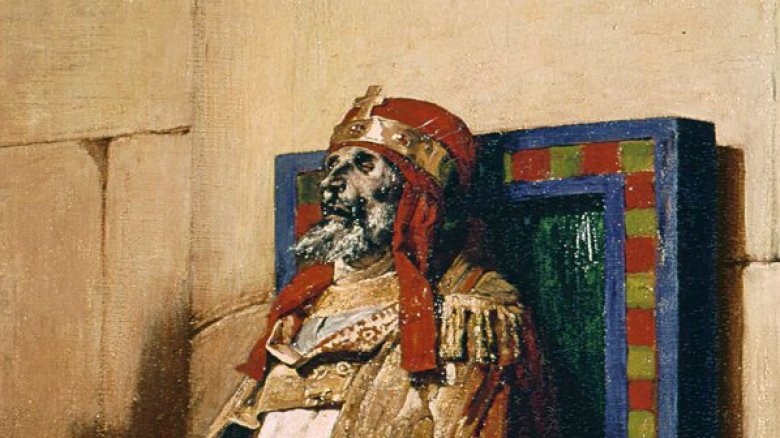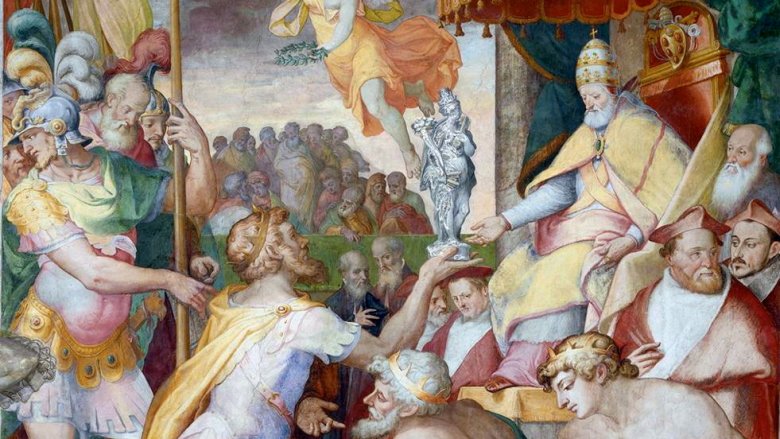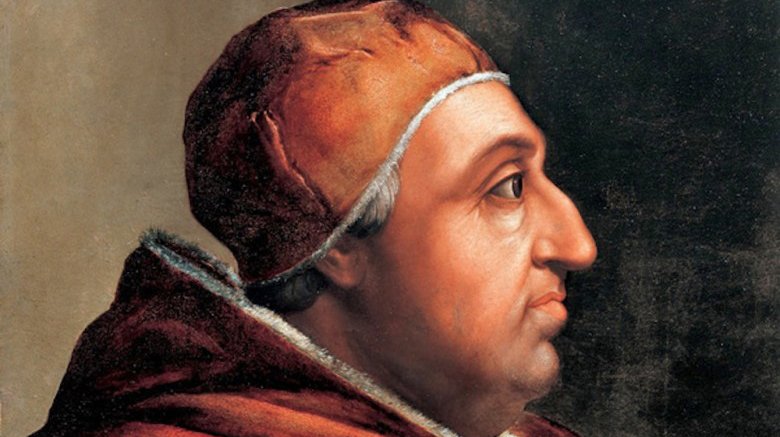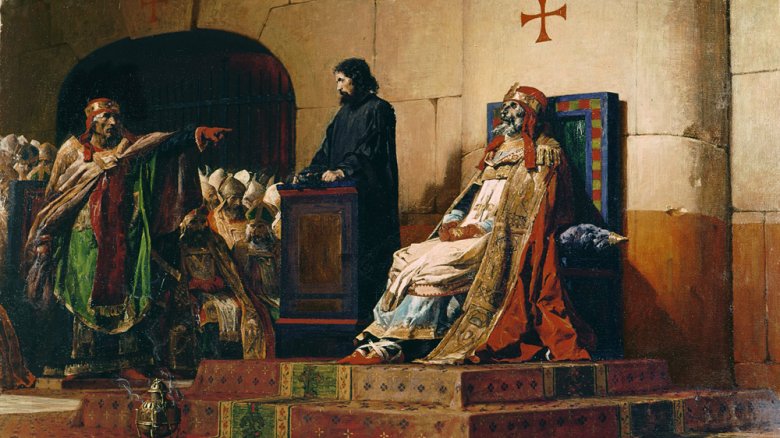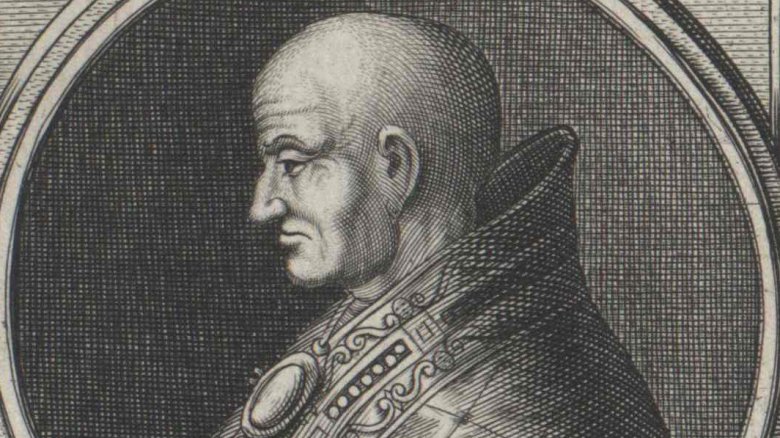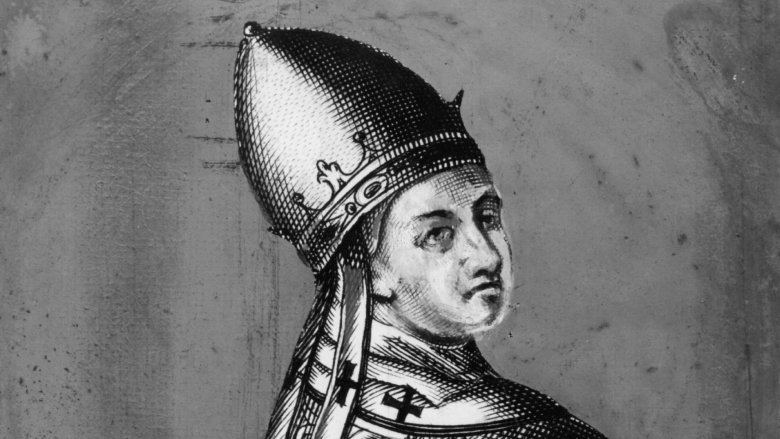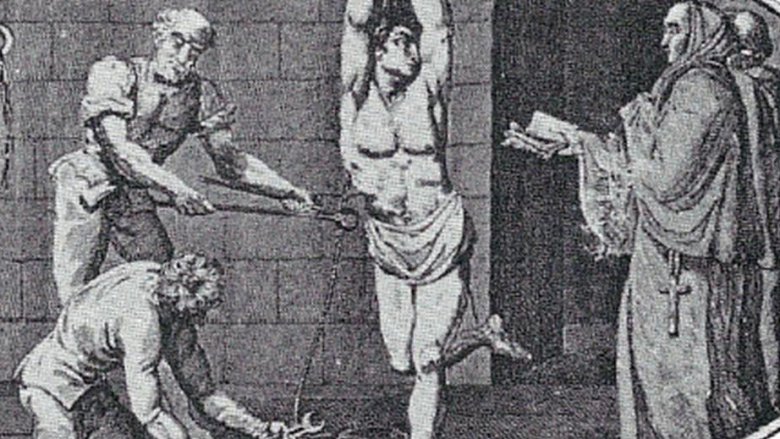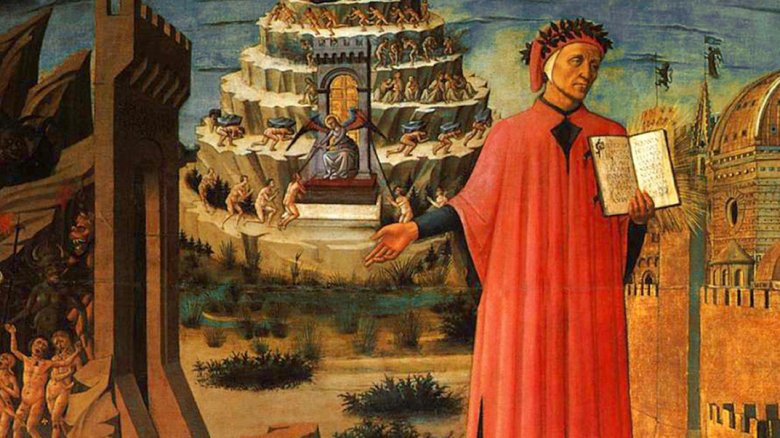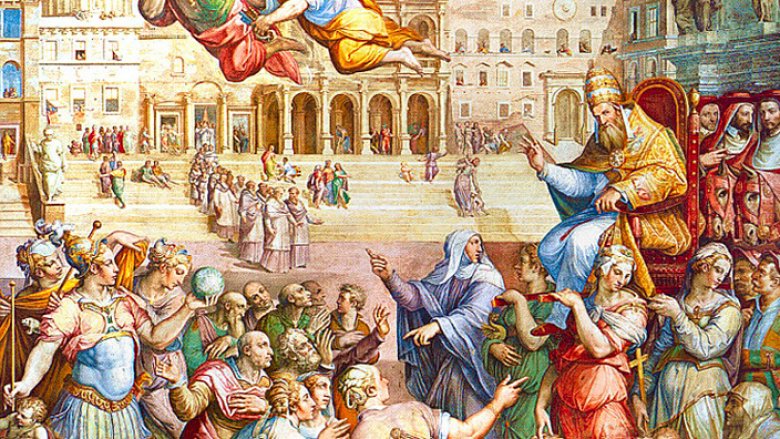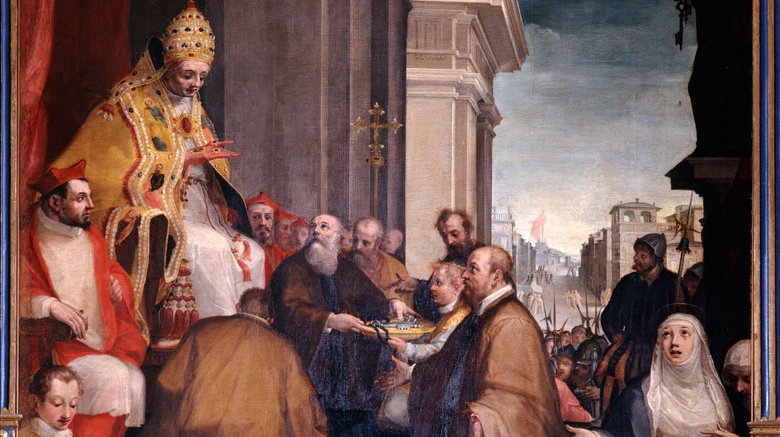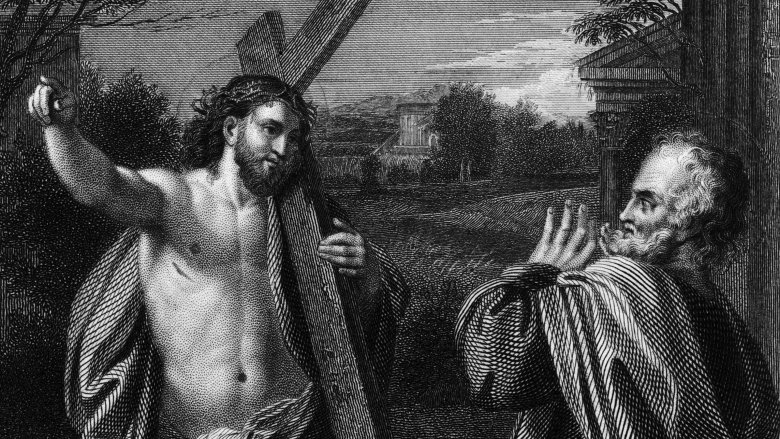Popes Who Were Actually Terrible People
Since the founding of the Roman Catholic Church almost 2,000 years ago, 266 men have held the office of the pope. They were — and in the case of Pope Francis, are — the leaders of the Church and the shepherds of its believers, and have wielded an incredible power, both spiritual and worldly.
Unfortunately, well, you know what they say about power, and it turns out that not every pope has been incorruptible. Dive deep into the history of the papacy, and you might find out that a handful of Holy Fathers were a little less holy than we would've liked. That's the kind of thing that happens when you have such a long history, but it maybe didn't have to get this ugly. From the bizarre desecration of a corpse to toasting the Devil and the one guy who managed to take St. Peter's throne three different times, here are several popes who were actually kind of terrible.
John XII, the Terrible Teen (955 - 964)
There is no pope in history who has a reputation as bad as John XII, but if we're being fair, it's not entirely his fault. You'd probably go a little wild too if someone put you in charge of the most powerful organization in the entire world when you were a teenager.
That's exactly what happened with Octavianus, a Roman prince who was elected pope at the tender age of 17. Maybe. See, there's a little bit of confusion on whether he was born in 930 or 937, but even if he was 24, that's still pretty young to take over the Catholic Church. Needless to say, it didn't work out that well. The renamed John XII viewed his position as more of a political office than a holy calling, and quickly set about using his power to ... well, to do exactly what you'd expect a teenager with the authority of the Almighty to do.
There's some debate over whether things in general were actually that immoral or whether this was just a reaction to women being put in positions of power, but John's immorality apparently went far beyond the bedroom and cheerfully toasting the Devil. The many crimes attributed to John XII included blinding and murdering his confessor, murdering another priest after castrating him, invoking the Roman gods while gambling with dice, and cheerfully toasting the Devil. Throw in the fact that he died in bed with another man's wife, and he might be the worst pope of all time — and the most metal by far.
Alexander VI, the poster boy for Bad Popes (1492 - 1503)
Of all the Holy Fathers to be notable for their less than sterling morality, Alexander VI is unquestionably the most famous, to the point where he's literally on the cover of a book by E.R. Chamberlain with the rather blunt title of The Bad Popes. This is probably not the legacy he was hoping to leave, but in his nine years as pontifex, Alexander VI was accused of murdering his political enemies with poison, unchecked nepotism, and various other things that popes are definitely not supposed to do, which occasionally resulted in children. That caused plenty of problems, especially when Alexander issued two conflicting official papal decrees about the parentage of the infamous "Roman Infant" who may have been his son, grandson, or both, depending whom you ask.
As for why he's so notable, you really only need to look at his name. Before ascending to the papacy, Alexander VI was Rodrigo Borgia. On the off chance that the name doesn't ring a bell, the Borgias were one of the most powerful families in Rome during the Renaissance and were so well known for their criminal exploits that Showtime made a prestige drama about them that ran for two seasons. Alexander VI in particular was considered so power-hungry and evil that he's literally the final boss of Assassin's Creed 2, one of the only video games we can think of that ends with the hero getting into a fistfight with the pope.
Of course, that all may have been exaggerated — and not just the video game stuff about the secret alien artifacts underneath the Vatican. As powerful as they were, the Borgias had plenty of equally powerful enemies, including Alexander's successor, Julius II. Most of Alexander's bad reputation comes from "evidence" gathered by Julius, who, if you believe modern pop culture interpretations, may have extracted it by torturing Alexander's servants and who probably belongs on this list as much as Alexander himself does.
Stephen VI (896 - 897)
We've all got someone we hate, but you have to think that if that person dies and then you become pope, you'd probably consider yourself to have won whatever argument it was that made you hate them to begin with. Not so for Stephen VI, who hated his predecessor Formosus so much that he dug him up and put his dead body on trial.
In what would later be called the Cadaver Synod, Steven propped the former pope's body up in a chair, assigned a deacon to speak for it, and, by all accounts, started screaming at the corpse about how Formosus was an illegitimate pope, including through a literal earthquake. Formosus was found guilty on all counts, so Stephen meted out the very logical punishment of chopping off the skeletal fingers that Formosus had used for blessings, buried him in an unmarked grave, then dug him up again and had his body thrown in the Tiber river.
Perhaps unsurprisingly, this did not sit well with the population of Rome, especially once the cadaver washed up on the banks of the Tiber and (allegedly) began performing miracles. Stephen VI was deposed, imprisoned, and strangled to death. As for Formosus, a few of Stephen's successors had him reburied with full honor, and also made a new rule that officially prohibited putting dead bodies on trial, which was the kind of rule that no one thought they actually needed to write down until then.
Sergius III and the Rule of the Harlots (904 - 911)
In 1942, historian and filmmaker John Farrow wrote that "there is little brightness to record in the dismal and disgraceful reign of this servile Pope," and believe it or not, that's actually one of the nicer things people have said about Sergius III.
Sergius came to power in a time when the Catholic Church in general and the papacy in particular were so legendarily afflicted with corruption that it has since become known as the Saeculum obscurum, or Dark Age. There is, however, a more colorful name given to the period that might give you a hint as to what Sergius' main interest was: In the 19th century, German philosophers referred to his tenure as the start of the "pornocracy." To be fair, this might just be a reaction to the fact that several women rose to power in Rome at the time, who were likely no more or less corrupt than their male counterparts, but that's the kind of name that sticks out in history books, and not exactly in the best way.
Even apart from whether this particular six decades — only nine years short of being the perfect length of time for its name — lives up to its reputation, Sergius himself is considered uniquely bad among popes, which is probably because he maybe ordered the murders of two of them himself. If that weren't bad enough, he was also a big fan of Stephen VI and upheld his conviction of Formosus, and when you're really into putting dead bodies on trial, pretty much everything else you do is going to be a little suspect, too.
Benedict IX, three-time loser (1032 - 1044, 1045, 1047 - 1048)
Generally speaking, being elected as pope is a lifetime appointment, which means that you only really have one chance for things to go disastrously wrong. Unless, of course, you're Benedict IX, who somehow managed to be pope three times over the course of his life, despite literally selling the office to his successor.
Like John XII, Benedict IX was elected at a young age (in his case, 20 years old), and also seems to have regarded his office as more of a political appointment than anything else. Despite managing to get an Ecclesiastical Hat Trick, however, he was incredibly unpopular. In 1036, he was run out of Rome due to allegations of "many vile adulteries and murders," and while he would return, he'd be expelled a second time in 1044.
Eventually, presumably tired of having to leave town every time the Roman population got mad at him, Benedict offered to resign from his position if he was paid off by his godfather, John Gratian. Desperate to get Benedict off the throne — probably because he was already on his way to being referred to by historian Ferdinand Gregorovius as "a demon from hell, in the disguise of a priest" — Gratian agreed and was elected as Gregory VI. Unfortunately, he had his own tenure invalidated thanks to (very accurate) charges that he'd bought his position through bribery. In the confusion that followed, Benedict discovered that retirement didn't agree with him, and retook the throne twice before finally being deposed.
Innocent IV okayed torture for "heretics" (1243 - 1254)
Today, no one expects the Inquisition, but in the 13th century, people were far more familiar with it. In an effort to suppress teachings and beliefs that ran counter to the official, canonical teachings and practices of the Catholic Church, Inquisitors were tasked with rooting out heretics and getting them to confess. Unfortunately for the Inquisition, getting someone to admit to doing something that will likely have them burned at the stake is notoriously difficult.
That's why Pope Innocent IV issued a decree called Ad extirpanda, in which he authorized the use of torture to extract confessions. That might sound a little weird for the leader of a religion built around someone who is himself one of history's most famous victims of being tortured for allegations of heresy, but hey, it's not like Innocent IV went wild with it. He specifically forbade Inquisitors from torturing people to death, cutting off limbs, or using torture more than once.
So, you know, it was just a little torture. Jesus would probably be fine with that, right?
Boniface VIII was a guest star in Dante's Inferno (1294 - 1303)
You have undoubtedly heard of The Divine Comedy, an epic poem from the 14th century by Dante Alighieri that's best known for its depiction of Hell. Dante's Inferno consists of nine circles, each stocked full of sinners whose crimes against God and Man get worse and worse until you finally get to the bottom, where Satan spends eternity chewing on history's most infamous traitors, Brutus, Cassius, and of course, Judas. If you back up a little and check out the eighth circle, however, you'll find a mention that Hell is eagerly awaiting the arrival of Pope Boniface VIII, who it seems was not exactly Dante's favorite person.
The reasons? Well, while not quite as bad as, say, a John XII, Boniface is largely remembered for his downright authoritarian view of the Church's role in the world, summed up by his declaration "that that every human creature be subject to the Roman pontiff." After taking over from Celestine V, a hermit who abdicated to go live in a cave rather than deal with the political maneuvering in Rome, Boniface attempted to raise money to start a new crusade. When that failed, he just went to war with Cardinal Jacopo Colonna instead.
It was during this conflict that Colonna's last holdout, the city of Palestrina, peacefully surrendered after promises by Boniface that they would be spared. Surprise! The city was actually razed to the ground and the Earth salted so nothing could grow there. It's not often that you can compare a pope to Darth Vader, but with Palestrina as his personal Alderaan, Boniface VIII certainly qualifies.
Gregory XI enslaved his enemies (1370 - 1378)
While Rome has been the traditional home of the Catholic Church since about 33 A.D., there was a period of about 70 years in the 14th century where the popes ruled from Avignon, France, instead, owing to political conflicts with France and the Holy Roman Empire. Eventually, however, Gregory XI decided that he wanted to regain control of the Papal States, which kicked off the truly Game of Thrones-sounding War of the Eight Saints against Florence.
Sadly, this particular conflict did not involve the Mother of Dragons. Instead, Gregory relied on some equally nontraditional tactics, including excommunicating every member of the Florentine government and banning all religious services in the city. When the Florentine citizens continued to hold religious services, Gregory instead authorized his armies to both seize their property and enslave the citizens themselves until his successor, Urban VI, signed a treaty that finally ended the war and restored the papacy to Rome. Uh, don't get too excited about Urban, though. He's not exactly the good guy in this scenario...
Urban VI wanted louder screams (1378 - 1389)
If Urban VI thought the Church's return to Rome was going to lead to a reconciliation between its warring factions, he was sorely mistaken. While he claimed to be the legitimate successor to the papacy, a faction that was left back in Avignon instead elected their own leader, who took the name Clement VII and began what is regarded as the second-biggest schism in the history of the Church.
While both Clement and Urban each claimed to be the true pope — adding to a long tradition of antipopes who made things so confusing that we went from John XIX to John XXI without a 20th John in there somewhere — Urban also had to deal with political strife that saw him imprisoned for a year and an insurrection from his own cardinals. When they attempted to depose him, Urban naturally followed the example set by Jesus in the Good Book, turned the other cheek, and forgave them.
Oh, no, wait. He actually had them arrested and tortured to death while reportedly complaining that their screams weren't loud enough.
St. Peter set a bad example (33 - 68)
If this list has shown anything, it's that despite their high office, popes aren't immune to the flaws the rest of humanity has. Really, though, they're just following in the footsteps of the very first pope, St. Peter, who was given the keys to Heaven and Earth by Jesus himself.
While he wasn't the worst of the apostles by a long shot — Judas Iscariot has that one in the bag — Peter is famously the one who promised that he would never deny Christ and then proceeded to do exactly that not once, but three times. Also, if you've ever heard the phrase "get thee behind me, Satan," that's not Jesus talking to the Devil. He's talking to Peter. Technically, though, that's all before he became the first pope. If you count his tenure as beginning after the Crucifixion, however, then his papacy includes calling down the Holy Spirit to strike two people dead for not giving all of their money to the Church, and (apocryphally) trying to get out of his own martyrdom until Jesus appeared to him and shamed him into going back to Rome by saying that if he didn't, Jesus would be crucified again in Peter's place.
All that said, plenty of theologians over the centuries have acknowledged Peter's flaws, and even suggested that was why he was what Jesus called the rock on whom he would build his church. His flaws made him human, which in turn made him a perfect candidate to be God's human representative on Earth. If he could be forgiven, maybe the rest of us can be, too. Except John XII, though. That dude was pretty rough.
